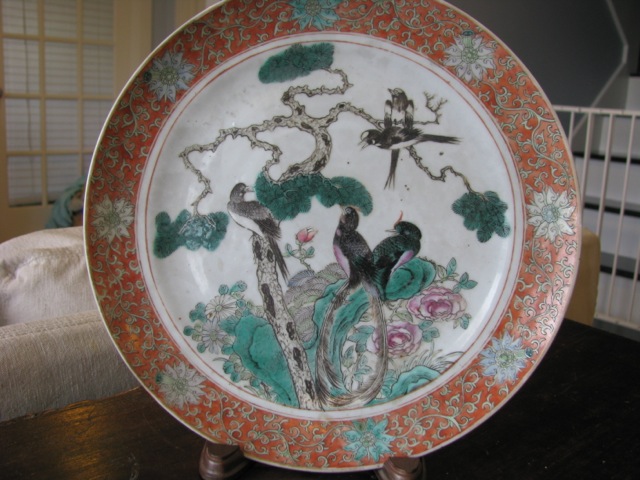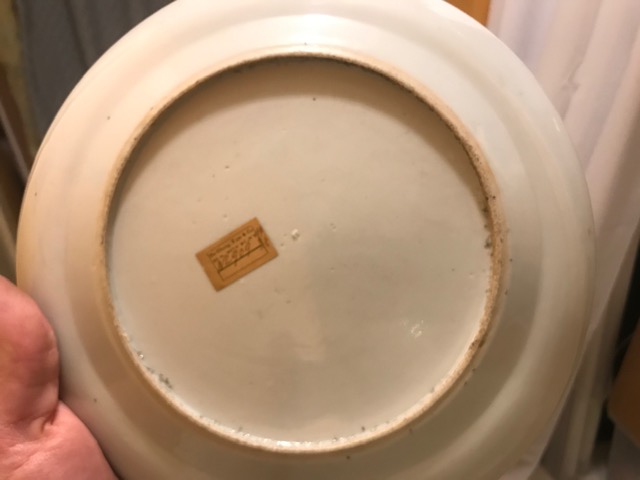
|
Subject:Re: Red and White Chinese Ceramic Plates info
Posted By: Bill H Thu, Feb 27, 2020
The foot and the label look definitely to be Chinese. This type of plate, with low-beveled foot rim, countersunk center and bits of kiln grit often stuck to the bottom (like the picture shows), were a staple of Jingdezhen during the late 19th century and, as far as I know, were phased out in the early 20th century, when new ceramics molding machinery superseded old methods
The paper label on the back is a type used in the early 20th century. I found a 1907 magazine on Country Life in America republished as a Google book showing an advertisement for the Chinese-sounding firm named He, Chong, Yum & Company, a New York City dealer in decorative orientalia, including dishes (see link for browser pasting below). The label shown in the above photo seems to show what may be a stock or accounting number, the top one possibly "仟" (Qian - banking anti-fraud number for "thousand"), and the bottom one perhaps "數" (shu - "Number", "figure", or "amount"). Others may have a better idea, but I'd take the handwriting to imply this was one of a large lot of dishes in the pattern.
During the early 20th century, it became quite common for US Customs to accept crateload sets of unmarked dishes for importation from China under paper labeling. Thus I would give yours a better chance of being Republic-Period (1912-49) than Qing, which dynasty ended in 1911.
LINK - https://books.google.com/books?id=axkiAQAAMAAJ&dq=He,+Chong,+Yum+%26+Co,+New+York+City&source=gbs_navlinks_s
Best regards,
Bill H.


|
 Red and White Chinese Ceramic Plates info
Red and White Chinese Ceramic Plates info  ( China & Japan ) - sam - Feb 24, 2020 (10:38 AM)
( China & Japan ) - sam - Feb 24, 2020 (10:38 AM)  Re: Red and White Chinese Ceramic Plates info - Larry - Feb 24, 2020 (09:15 PM)
Re: Red and White Chinese Ceramic Plates info - Larry - Feb 24, 2020 (09:15 PM)  Re: Red and White Chinese Ceramic Plates info
Re: Red and White Chinese Ceramic Plates info  - sam - Feb 25, 2020 (07:44 AM)
- sam - Feb 25, 2020 (07:44 AM)  Re: Red and White Chinese Ceramic Plates info - Larry - Feb 26, 2020 (12:03 AM)
Re: Red and White Chinese Ceramic Plates info - Larry - Feb 26, 2020 (12:03 AM)  Re: Red and White Chinese Ceramic Plates info - sam - Feb 26, 2020 (05:37 PM)
Re: Red and White Chinese Ceramic Plates info - sam - Feb 26, 2020 (05:37 PM)  Re: Red and White Chinese Ceramic Plates info - Bill H - Feb 27, 2020 (06:57 PM)
Re: Red and White Chinese Ceramic Plates info - Bill H - Feb 27, 2020 (06:57 PM)  Re: Red and White Chinese Ceramic Plates info - sam - Feb 28, 2020 (11:01 AM)
Re: Red and White Chinese Ceramic Plates info - sam - Feb 28, 2020 (11:01 AM)  Re: Red and White Chinese Ceramic Plates info - OLiver Watson - Feb 29, 2020 (09:30 PM)
Re: Red and White Chinese Ceramic Plates info - OLiver Watson - Feb 29, 2020 (09:30 PM)  Re: Red and White Chinese Ceramic Plates info - Larry - Feb 29, 2020 (05:48 PM)
Re: Red and White Chinese Ceramic Plates info - Larry - Feb 29, 2020 (05:48 PM) 

